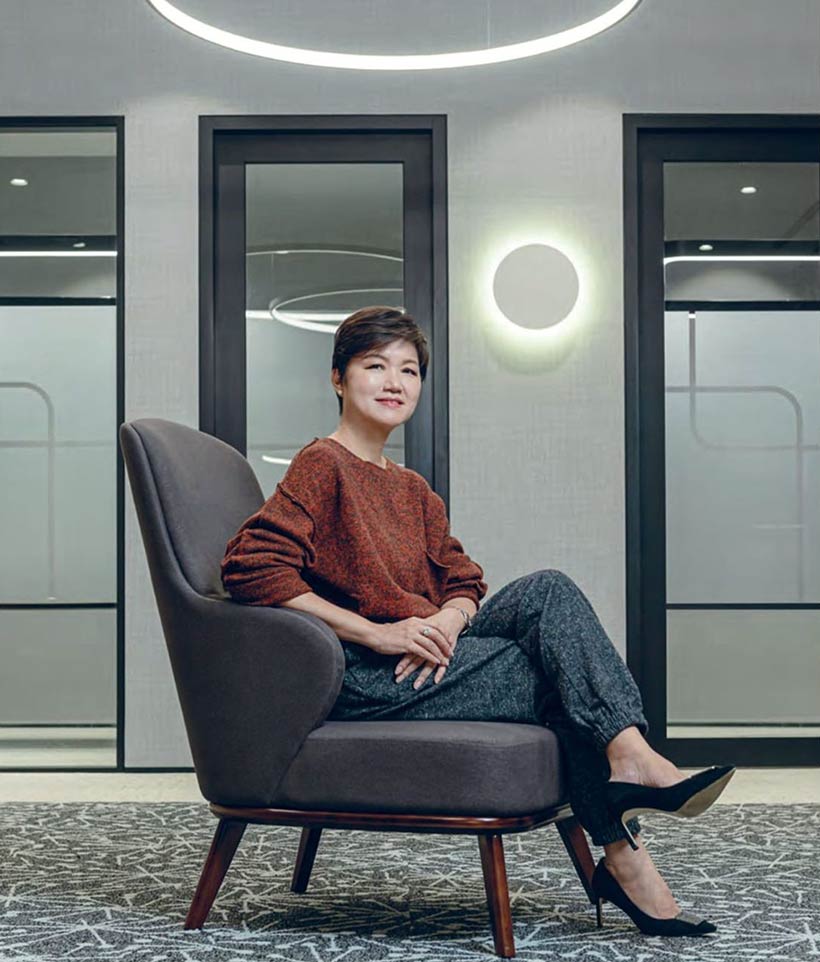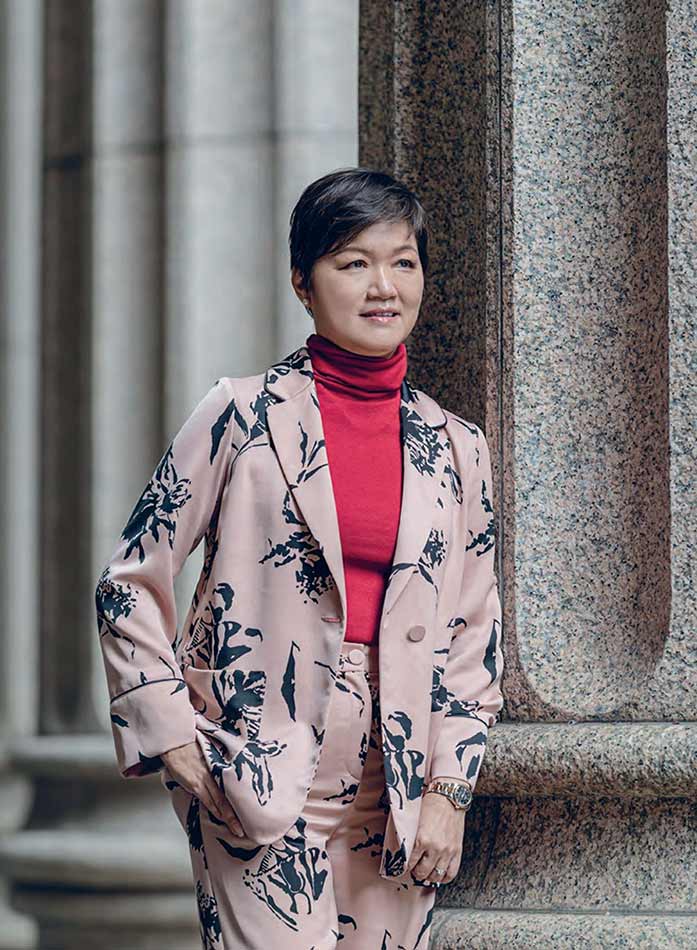Great Expectations
Whoever said women weren’t good with money haven’t met Jesslyn Tan. The CEO of Great Eastern Financial Advisers shares her insights on the changing landscape of women and finance.
 Photo Source: PORTFOLIO Photography by Chino Sardea; Art Direction by VC Chong Styling by CK Koo; Hair & Makeup by Nikki Fu
Photo Source: PORTFOLIO Photography by Chino Sardea; Art Direction by VC Chong Styling by CK Koo; Hair & Makeup by Nikki Fu
By Charmian Leong
Women today control a third of the world’s wealth, adding US$5 trillion (S$6.8 trillion) to the global wealth pool every year. And according to Boston Consulting Group, this number will rise to US$97 trillion by 2024. These are heartening figures that many will attribute to the growing number of female entrepreneurs and women in STEM — you know, the ones who grab headlines with their social impact investing and world-changing research.
But let’s not forget that there are women working behind the scenes that have played just as significant a role in this global shift. Women who have worked tirelessly in the financial advisory landscape to ensure people’s wealth and health are either growing or safeguarded. Women who have stubbornly forged their own path through a male-dominated industry to emerge at the very top. Women like Jesslyn Tan.
Tan is CEO and a founding member of Great Eastern Financial Advisers (GEFA), Singapore’s first financial advisory firm to be affiliated with a life insurer. Her career with Great Eastern began in 2001, where her role as Head of Centre for Excellence involved overseeing the training and recruitment for financial representatives. A decade later, she was approached by the top brass to take up a pioneering role for GEFA.
“The hybrid business model and its winning formula appealed to my entrepreneurial instincts,” she says, explaining how a company that could combine the strength of a large insurance firm with the wider offering of financial advisory products would enable her to reach out to more people with much-needed holistic, value-added services.
 Photo Source: PORTFOLIO Photography by Chino Sardea; Art Direction by VC Chong Styling by CK Koo; Hair & Makeup by Nikki Fu
Photo Source: PORTFOLIO Photography by Chino Sardea; Art Direction by VC Chong Styling by CK Koo; Hair & Makeup by Nikki Fu
Under her leadership, the firm has grown from a team of 300 to 3,000, and its success has not been dampened by the pandemic. Since Great Eastern had already been on a digital transformation journey for the past few years, pivoting to online services was a seamless process. “However, being customer-centric is and must continue to be part of our DNA. Though digital communications will be the norm, we cannot replace the human-to-human engagement between financial consultants and our clients,” she stresses.
A deep understanding of clients’ needs (and the changing nature of clients in general) is what gives GEFA its competitive edge. Noticing that wealth is transitioning from millennials to Generation Z, Tan has steered the company to be at the forefront of grooming young talent. And seeing how Singapore has become an increasingly popular enclave for the offshore high net worth segment has led to GEFA to stand firmly behind legacy planning and the preservation of wealth for future generations.
Wealth, it would seem, is better understood and handled than ever before, but a UBS Global Wealth Management study last year reported nearly half the married women in their survey said they defer major financial decisions to their spouse. Tan believes otherwise.
“According to an academic paper published in March, women are still financially less literate than men, and posits that one of the reasons this gap exists isn’t necessarily a lack of knowledge, but lack of confidence.”
“This is not true based on what we see and hear. The majority of those who have attended our financial planning seminars — even before the pandemic — have been women. From the feedback we received, we found that they appreciated the fact that health and wealth topics were curated to their needs, and that they were prioritized over their male counterparts, thus giving them a reason to participate, learn, and have good fun.”
However, according to Fearless Woman: Financial Literacy and Stock Market Participation, an academic paper published in March this year, women are still financially less literate than men, and posits that one of the reasons this gap exists isn’t necessarily a lack of knowledge, but lack of confidence. To this, Tan offers practical advice: “There are ready resources online for them to read up on financial matters, or they can get started by attending seminars on financial planning.”
Whatever the cause for this inaction, a good head start in the basics of financial literacy would have helped to circumvent this helplessness. Which is why Tan strongly encourages young parents or parents-to-be consider equipping their children with financial smarts from an early age. “Saving their pocket money, not spending more than what they have, and the importance of budgeting — these are good and crucial habits that will empower our children to take greater control of their finances when they’re older.”
Educated or otherwise, there are still those who would prefer to leave such matters in the hands of professionals like Tan and her team, and this is a demographic that requires its own investment approach. “Different people have different financial goals and risk appetites,” acknowledges Tan. “But because women have on average a longer life expectancy than men (about 87.6 years), it is important that wealth managers take this into account, and suggest that retirement planning start early.”
Considerable industry experience and a strong sense of purpose appear to have given Tan a clear enough road to the C-suite. When asked about gender-related roadblocks she may have faced during her career, Tan deftly parries: “I believe one’s capabilities should be recognized, regardless of gender,” she says, recognizing that gender diversity is important in the workplace, even at the board level. She points out that her appointment as CEO is proof that excellence will afford one the opportunities to rise to leadership positions, and would like to encourage more women to be similarly confident.
“I find that women tend to be generally less assertive when it comes to voicing their career aspirations and their capabilities to their bosses. But I believe that women can and should be unafraid of being more prolific, and take greater charge of their career development with confidence and certainly with effort.”
In fact, the encouragement she gives her own daughter are wise words that all women young and old would do well to internalize: “Pursue your interests and passions, keep learning, and stay on this journey of self-discovery. Most importantly, do not set a limit to what you can achieve, and be tenacious in doing your best at all times.”
This article was first published in PORTFOLIO in August 2021.


